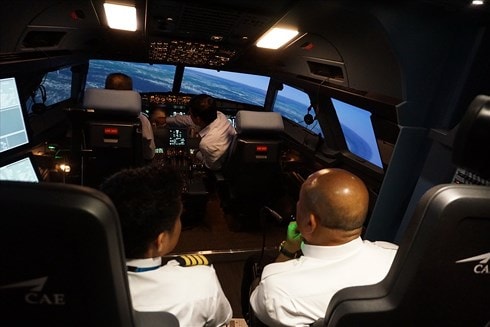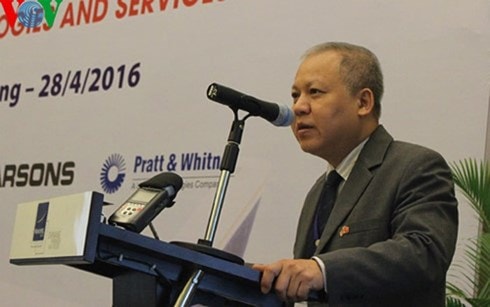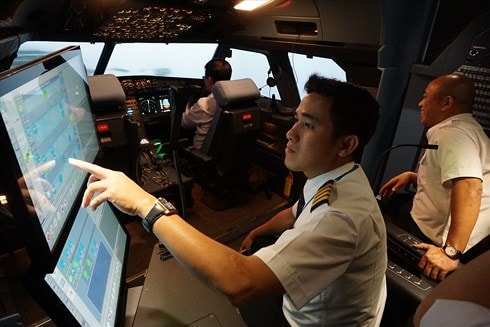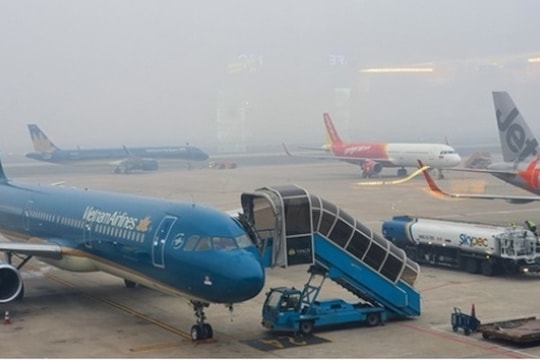Vietnamese pilots meet ICAO standards, incidents are isolated
Pilot training and recruitment of airlines must comply with strict regulations not only in Vietnam but also in the world.
After the uproar over the alleged bribery in training, testing and reimbursement of pilot training costs at Vietnam Airlines, National Assembly delegate Nguyen Sy Cuong sent a document to Minister of Transport Nguyen Van The requesting that the Ministry of Transport clarify these "controversies".
|
| Inside the simulated cockpit of Vietnam Airlines' Airbus A320/321 aircraft. Photo: MQ |
Specifically, according to National Assembly delegate Nguyen Sy Cuong, he has contacted a number of pilots (including Mr. Cuong’s family members) working at Vietnam Airlines and found a number of issues that need to be seriously considered. There is a phenomenon of learning only as a “formal” thing, and to pass, you have to pay a bribe, up to tens of thousands of USD. From that, it can be inferred that the quality of pilot input is “very problematic”.
To clarify the above information, VOV.VN reporter had an interview with Mr. Vo Huy Cuong, Deputy Director of the Civil Aviation Authority of Vietnam (Ministry of Transport) about related contents. Especially the training and recruitment process of pilots of airlines must meet what standards...
Reporter: Recently, there has been public information reflecting and doubting the quality of pilot training and recruitment. As a State management unit, can you elaborate on this issue?
Mr. Vo Huy Cuong:I think that being a pilot - an aircraft operator - is a special profession, so there are many strict regulations in selecting and training people to become pilots, requiring time and effort not only from the organization but also from the individual student to become a pilot.
|
| Mr. Vo Huy Cuong, Deputy Director of the Civil Aviation Authority of Vietnam (Ministry of Transport) spoke at an aviation conference. |
Recently, Vietnamese pilots have been trained abroad, including in the United States, New Zealand, Australia... and all of these training schools have been evaluated and approved by the Civil Aviation Authority of Vietnam (CAAV) as qualified to meet the requirements for commercial pilot training.
Accordingly, the first requirement is that all pilot training schools must be recognized by the Civil Aviation Authority - the aviation authority of the host country - as qualified as pilot training schools.
In addition, with socialization, many families also spend their own money to send their children to outside schools to train pilots, but most of them contact the Civil Aviation Authority of Vietnam and airlines to find out which schools have the conditions to train pilots to study.
In addition, they rely on the list of pilot training schools approved by the Civil Aviation Authority of Vietnam.
As for families who do not approach the Civil Aviation Authority of Vietnam or the airlines, they can choose other schools for training, but basically when they return home, to become pilots, they must go through a series of other very strict procedures of the Civil Aviation Authority, because Vietnam is one of the members of the International Civil Aviation Organization (ICAO), which uses ICAO standards as the global standard and common standard in the field of pilot training.
Becoming a pilot does not mean just flying. While working continuously, there is a training process to maintain skills, regulations for being a pilot, advanced training to supplement new knowledge to ensure access to new aircraft technology that manufacturers offer to improve and install aircraft...
Pilot training is a continuous process, not just a one-time training but a long-term training.
PV: So, for pilots to fly, first of all, they must meet the recruitment quality requirements and must ensure compliance with foreign and international standards and the Civil Aviation Authority of Vietnam?
Mr. Vo Huy Cuong:That's right. Our country's pilots are licensed by the Civil Aviation Authority of Vietnam. In addition to flying for domestic airlines, they also fly under the name of other airlines such as Emirates, Philippines, Indonesia, Norway... All pilot licenses issued by the Civil Aviation Authority are recognized in a number of countries.
|
| The Civil Aviation Authority of Vietnam affirms that the quality of Vietnamese pilots is not inferior to any foreign pilots.Photo: MQ |
Pilots without exception including English proficiency (at least level 4) can become pilots to fly commercially, not only domestically but also internationally.
Even many students who study to fly airplanes for a long time may learn a foreign language because the skills of operating airplanes are learned very quickly, but foreign language is a process.
It can be affirmed that the quality of Vietnamese pilots is not inferior to any foreign pilots. The skill level of Vietnamese pilots is equivalent to the world because English must reach level 4, and updated knowledge of aircraft operations so that pilots can fully master the new generation of aircraft such as Boeing 787-9, Airbus A350 of the manufacturers.
Reporter: Regarding the recent incidents of landing off the runway at Vinh and Noi Bai airports, is it due to the quality of pilot training, sir?
Mr. Vo Huy Cuong:In the aviation industry, accidents can happen at any time, accidents have many specific reasons and human factors are one of the causes of accidents.
Some recent Vietnamese aviation incidents were not due to training quality but due to human error, possibly failure to fully implement operating procedures, or aircraft conditions leading to the incident.
Reporter: In a document sent to Minister Nguyen Van The, National Assembly delegate Nguyen Sy Cuong stated that there are currently problems in the process of training, testing, interviewing, and transferring pilots. What is the role of the Civil Aviation Authority in granting licenses to transfer aircraft types for pilots today?
Mr. Vo Huy Cuong:When training for conversion, there are centers approved by the Civil Aviation Authority of Vietnam such as the SYM Flight Center of Vietnam Airlines in the country, and in foreign countries such as the Philippines, Malaysia, Singapore... which are units inspected and evaluated by the Civil Aviation Authority of Vietnam as having the capacity to organize training and conversion of pilots between aircraft types when operating for a specific airline in Vietnam.
The conversion process follows specific procedures specified in the Aviation Safety Regulations.
The aircraft type is transferred by means of a theoretical test on a computer in an open, transparent manner without interference from anyone. After that, SYM flight training on the machine system and the results of the pilots performing simulated flights are fully recorded and not all pilots passing the test of the Civil Aviation Authority of Vietnam pass, the failure rate in theory is relatively high.
Pilots must take additional courses and pass the exam before they can get a license and work as a pilot for a specific airline in Vietnam.
PV: It must be said that the process is very strict, however, in recent times, there have been many incidents such as wrong landings, landings off the runway... So how will the Civil Aviation Authority rectify and overcome these shortcomings, sir?
Mr. Vo Huy Cuong:Not only in Vietnam but also in the world, any incident, big or small, is thoroughly investigated to find out the objective and subjective causes to prevent future incidents.
That information is shared with the world aviation community to avoid similar risks from happening.
Any incident in our country is investigated, commented on and notified to relevant units or airlines to update information and learn from experience in flight operations.
All training and recruitment processes for pilots of airlines must comply with strict regulations, not only in Vietnam but also in the world. Airlines can improve their regulations and the Civil Aviation Authority encourages them to ensure safety and quality./.
Thank you!
It costs a lot of money to become a pilot of Vietnam Airlines?
According to National Assembly delegate Nguyen Sy Cuong, since 2013, Vietnam Airlines has implemented a policy of socializing pilot training. However, this has led to many problems, along with policies when leaving work that have made pilots angry.
Mr. Cuong said that in the past, pilots studying in France and Australia had very strict "input" selection, from health, knowledge to flying skills. But since the socialization, the selection has become just a formality, almost any subject with enough money to pay for tuition (from a list of schools selected by Vietnam Airlines, approved by the Civil Aviation Authority of Vietnam) can go to school.
Most flight schools in the US are small, unknown schools, with low tuition fees, so the quality of teaching is also low. There are some very poor pilot schools, just pay to pass the exam, even pay to have enough flight hours.
After completing these courses, students are interviewed and tested to transfer to the Airbus A321 - Flight Simulator. This is a very difficult aircraft to learn because it requires time and a fairly high level of skill.
“Most recently, in April 2018, there was a complaint from a pilot trainee about some negative things that happened during the training process,” Mr. Nguyen Sy Cuong stated, adding that there are currently problems in the process of training, testing, interviewing, and transferring pilots.
Even the phenomenon of offering 20,000 - 25,000 USD for an interview is becoming more and more blatant (interviewing students from the US to change to the A321 aircraft type; interviewing to change from co-pilot A321 to co-pilot of other aircraft types such as A350 or B787, interviewing to upgrade co-pilot to captain....).
Most of the pilots who are in this interview category will receive a direct phone call, mentioning the payment. The above incident cannot be done by an individual but must be organized. Vietnam Airlines lists the candidates for the interview, flight crew 919 conducts the interview...





